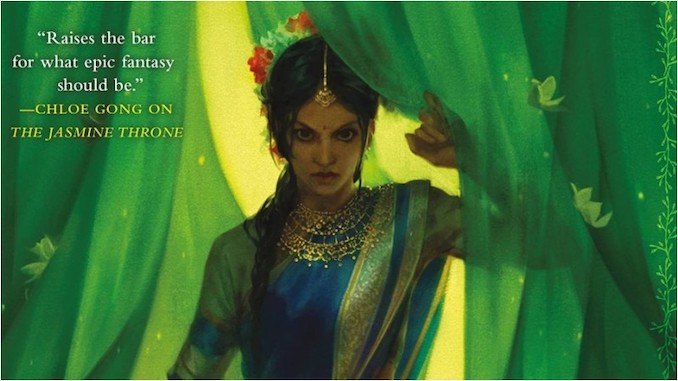The Oleander Sword Is a Gut-Wrenching Sequel With a Killer Cliffhanger

Whenever you read a really good series opener, it’s fairly easy to start wondering if the quality of that first book was somehow a fluke. To question whether there’s any chance that its sequel could ever live up to the heights of its predecessor, or if it’s doomed to always pale in comparison. Someone coined the term “sophomore slump” for a reason, after all, and most of us who read a lot of fantasy can easily name more than one series whose middle installment was….let’s just say did not turn out to be everything we hoped it could be.
This is why it’s especially satisfying when a sequel arrives that not only exceeds our expectations but blows them out of the water entirely, holding on to the things we loved about the original novel but adding compelling new pieces that make the story even richer and more compelling than it was before. Such is the case with Tasha Suri’s The Oleander Sword, a complex, immersive follow-up that’s packed with surprises, sacrifices, and characters that are easy to root for even when they are often difficult to like.
Suri’s The Jasmine Throne was hands-down one of the best fantasy releases to hit shelves in 2021, a doorstopper of a series opener that immediately set up her Burning Kingdoms trilogy as one to keep a close eye on in the fantasy genre space. Set in a fully realized magical world inspired by ancient India, its sprawling, complex story features half a dozen major POV characters and multiple distinct kingdoms with their own clearly defined cultural histories, political hierarchy, and religious practices. (It’s an amazingly rich and lived landscape, is what I’m saying.)
Thanks to the thorough world-building that takes place in Jasmine Throne, Oleander Sword is able to hit the ground running, weaving together the battle for the fate of a kingdom, the future of the series’ central relationship, and the threat of an encroaching magical disease known as the rot into something truly epic in scope. Wrestling with issues of theology, politics, magic, family, and love, this is a sequel that takes everything you loved about the first book in the series and cranks it up to eleven before essentially smashing it on the ground while you watch. (And I mean that in the best possible way.)
Princess Malini, having now declared herself Empress of Parijatdvipa, is marching to war against her fanatical brother (and current emperor) Chandra, with a ragtag coalition held together by little more than her own will. Struggling to maintain control over a group of generals who doubt her every move and faced with her brother’s uncomfortably powerful new magical weapon, she seeks out one of her own in the form of the lover she left behind. Malini’s selfish need to use Priya’s magic for her own ends is undercut by the very real desire she has to be with her again.
-

-

-

-

-

-

-

-

-

-

-

-

-

-

-

-

-

-

-

-

-

-

-

-

-

-

-

-

-

-

-

-

-

-

-

-

-

-

-

-








































